“Honesty is praised and starves.” — Juvenal
Fitting

… balances. The bottom half of each letter mirrors the top.
“Imitation”
Calm and implacable,
Eyeing disdainfully the world beneath,
Sat Humpty-Dumpty on his mural eminence
In solemn state:
And I relate his story
In verse unfettered by the bothering restrictions of rhyme or metre,
In verse (or “rhythm,” as I prefer to call it)
Which, consequently, is far from difficult to write.
He sat. And at his feet
The world passed on — the surging crowd
Of men and women, passionate, turgid, dense,
Keenly alert, lethargic, or obese.
(Those two lines scan!)
Among the rest
He noted Jones; Jones with his Roman nose,
His eyebrows — the left one streaked with a dash of gray –
And yellow boots.
Not that Jones
Has anything in particular to do with the story;
But a descriptive phrase
Like the above shows that the writer is
A Master of Realism.
Let us proceed. Suddenly from his seat
Did Humpty-Dumpty slip. Vainly he clutched
The impalpable air. Down and down,
Right to the foot of the wall,
Right on to the horribly hard pavement that ran beneath it,
Humpty-Dumpty, the unfortunate Humpty-Dumpty,
Fell.
And him, alas! no equine agency,
Him no power of regal battalions –
Resourceful, eager, strenuous –
Could ever restore to the lofty eminence
Which once was his.
Still he lies on the very identical
Spot where he fell — lies, as I said, on the ground,
Shamefully and conspicuously abased!
– Anthony C. Deane, in Carolyn Wells, A Parody Anthology, 1922
A Natural Seat

John Krubsack grew a chair. The Wisconsin banker planted 32 box elders in 1903, and as they grew he grafted them into a living piece of furniture.
In 1911 he began lending “The Chair That Grew” to international exhibitions; today it’s on display at his nephew’s furniture store.
Hendecadivisibility
To discover whether a number is divisible by 11, add the digits that appear in odd positions (first, third, and so on), and separately add the digits in even positions. If the difference between these two sums is evenly divisible by 11, then so is the original number. Otherwise it’s not.
For example:
11 × 198249381729 = 2180743199019
Sum of digits in odd positions = 2 + 8 + 7 + 3 + 9 + 0 + 9 = 38
Sum of digits in even positions = 1 + 0 + 4 + 1 + 9 + 1 = 16
38 – 16 = 22
22 is a multiple of 11, so 2180743199019 is as well.
Fair Enough
A lady wrote to her lover, begging him to send her some money. She added, by way of postcript, ‘I am so ashamed of the request I have made in this letter, that I sent after the postman to get it back; but the servant could not overtake him.’
– The Poetry and Varieties of Berrow’s Worcester Journal for 1828
Open and Shut

Every room in my house has an even number of doors.
Prove that the house has an even number of exterior doors.
Fugitive Truth
When I conduct a psychological experiment, my expectations might influence the outcome.
That’s called the experimenter expectancy effect. Does it exist? Well, we could do an experiment to detect it …
… but if it exists then it would bias the experiment, and if it doesn’t then we’d detect nothing. Either way, it seems, we can’t reliably assess what’s happening.
Offside

Only 23 U.S. states are entirely south of Canada’s southernmost point, Middle Island in Lake Erie.
Warm Work
(Please don’t try this.)
[T]ar … boils at a temperature of 220°, even higher than that of water. Mr. Davenport informs us, that he saw one of the workmen in the King’s Dockyard at Chatham immerse his naked hand in tar of that temperature. He drew up his coat sleeves, dipped in his hand and wrist, bringing out fluid tar, and pouring it off from his hand as from a ladle. The tar remained in complete contact with his skin, and he wiped it off with tow. Convinced that there was no deception in this experiment, Mr. Davenport immersed the entire length of his forefinger in the boiling cauldron, and moved it about a short time before the heat became inconvenient. Mr. Davenport ascribes this singular effect to the slowness with which the tar communicates its heat, which he conceives to arise from the abundant volatile vapour which is evolved ‘carrying off rapidly the caloric in a latent state, and intervening between the tar and the skin, so as to prevent the more rapid communication of heat.’ He conceives also, that when the hand is withdrawn, and the hot tar adhering to it, the rapidity with which this vapour is evolved from the surface exposed to the air cools it immediately. The workmen informed Mr. Davenport, that, if a person put his hand into the cauldron with his glove on, he would be dreadfully burnt, but this extraordinary result was not put to the test of observation.
– David Brewster, Letters on Natural Magic, 1868
